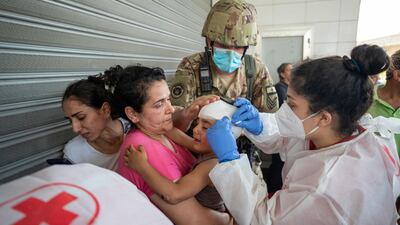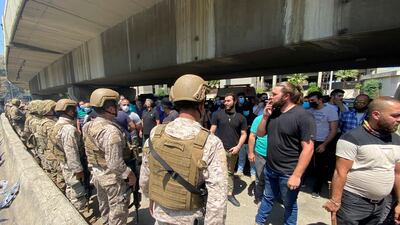Thousands of Syrians flocked to the Syrian embassy in the Beirut suburb of Yarze in the early hours of Thursday carrying posters of incumbent president Bashar Al Assad and flying Syrian flags to take part in presidential elections.
“I came to vote for President Bashar Al Assad. With my blood and my soul, I'll stand by him at every single election,” said Abdul Rahman Hussein, a Syrian construction worker who held a Syrian flag with Mr Al Assad’s face printed in the middle, above the words “Syria is well”.
But during the early elections hours, convoys of cars with Mr Al Assad's posters were attacked by mobs as they drove through neighbourhoods known for their opposition to Syria.
Syria and Lebanon have a complicated historical relationship, with the former occupying the latter for 29 years.
Lebanon remains deeply divided politically between supporters and critics of Damascus who accuse the Syrian regime of being behind a wave of political assassinations.
Videos shared on Thursday by local media showed men beating passengers sitting in cars with Bashar Assad posters, breaking windows and jumping repeatedly on car roofs on a highway north of Beirut.
Another video appears to show an incident in the capital’s Sassine square, with police intervening near a smashed car. The state-run National News Agency reported that “a number of people were injured.”
Both areas are closely linked to Christian political party, the Lebanese Forces. Party leader Samir Geagea said on Wednesday that Lebanese authorities should send Syrians who vote for Mr Al Assad back to Syria, arguing that they do not qualify as refugees.
Contacted by The National, a Lebanese Forces spokesperson denied that the party had organised attacks against Syrians.
Over 800,000 Syrians are registered as refugees with the United Nations, but Lebanese officials believe their number exceeds one million.
After a decade-long civil war, Mr Al Assad remains in power and has re-asserted his dominance in most of Syria.
Presidential elections will take place in regime-controlled areas in Syria on May 26.
Nasser Yassin, professor of policy and planning specialised in refugee studies at the American University of Beirut, told The National that attacks against Syrians were "truly alarming." "This is an act on the verge of communal tension," he said.
“Equally alarming is the show that has been put on by Assad supporters. It’s very unwise for the Lebanese authorities to allow these pro-regime acts of mobilisation. They (Syrians) could have voted quietly.”
A spokesperson for the United Nations High commissioner for Refugees told The National that the agency has received reports of "incidents involving pressure, threats and harassment affecting Syrian refugees in Lebanon and in relation to the Syrian presidential elections. The reported incidents range from confiscation of documents to threats of physical harm."
Syria’s ambassador to Lebanon Ali Abdul-Karim Ali denied reports of ill-treatment and said that 247,000 Syrians had registered to vote in the presidential elections in Lebanon.
“Syria is a country that respects its people,” he said.
Mr Ali called on Syrians to go home, saying that over a million Syrians living in neighbouring countries including Lebanon had returned in the past year and a half.
“We are asking Western countries and the countries that support terrorism to re-assess their position towards Syria,” he said. Western countries and the UN have slammed the elections as a farce.
Many believe that Mr Al Assad, who has been in power since 2000, is sure to be re-elected. He is running against two obscure candidates, Abdallah Saloum Abdallah and Mahmoud Ahmed Marei.
“I voted for Bashar. I don’t know who the others are,” said Muhammad Fahed, a Syrian who came to vote from the eastern region of the Bekaa.
But another Bar Elias resident said that many Syrians in the region did not travel to the embassy to vote on Thursday.
Tarek, a Syrian refugee who asked for his name to be changed out of fear of retaliation against his family in Syria, said: "I will vote on one condition only: that they return my brother to me."
Tarek believes that Syrian troops executed his brother in 2013 near their hometown of Homs on terrorism charges.
"If Assad wins again, my next step will be to emigrate, and leave Arab countries altogether," he told The National.
Ali, a Syrian journalist living in Beirut who asked for his name to be changed, said he felt it would be “pointless” to vote.
“The elections are just for show,” he said. “Bashar will remain in power.”
“Maybe if the elections took place under international supervision, more people would be encouraged to vote,” he said. The Syrian elections have been criticised by the UN.
Ali said that he feared going to the Syrian embassy, which is surrounded by Lebanese army checkpoints. Like many Syrians, his residency permit has expired under tough local laws that make it difficult to live legally in Lebanon.
Ali also worries about entering the embassy grounds. “I fear sharing information about my work or my income with Syrian authorities. They could use it to hurt me or my family,” he said.
Syria’s ambassador to Lebanon dismissed claims of arbitrary detention and torture, which have been documented by human rights groups.
Mr Ali said: “This is unfair, and wrong.”
On the same day as Syrian presidential elections went ahead in Lebanon, the Lebanese army announced that it had arrested 125 Syrians attempting to leave the country illegally by boat in the Mediterranean Sea.
The group had left the northern Lebanese town of Arida, a route that is usually taken by smugglers attempting to reach Cyprus.
















